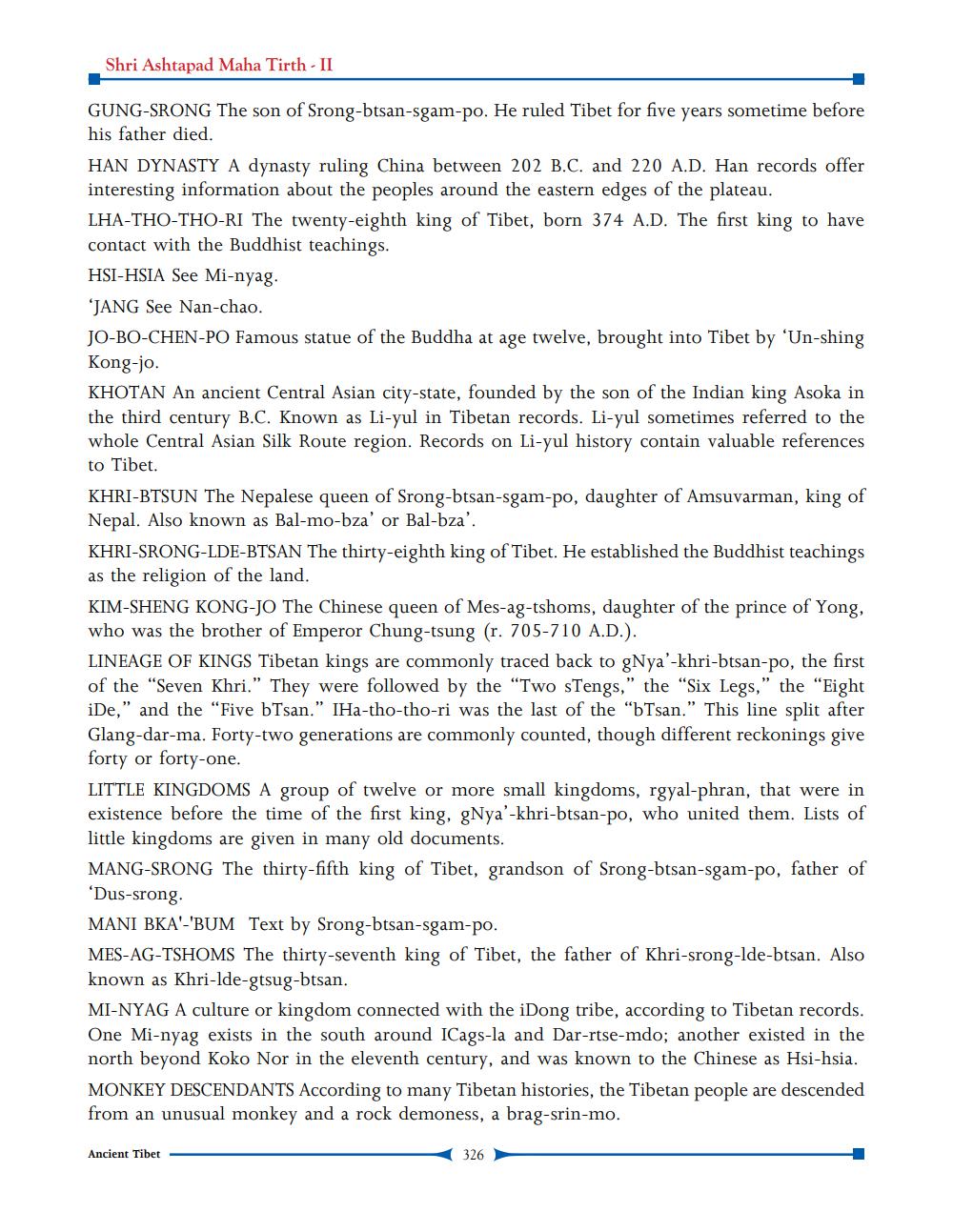________________
Shri Ashtapad Maha Tirth - II
GUNG-SRONG The son of Srong-btsan-sgam-po. He ruled Tibet for five years sometime before his father died.
HAN DYNASTY A dynasty ruling China between 202 B.C. and 220 A.D. Han records offer interesting information about the peoples around the eastern edges of the plateau. LHA-THO-THO-RI The twenty-eighth king of Tibet, born 374 A.D. The first king to have contact with the Buddhist teachings.
HSI-HSIA See Mi-nyag.
'JANG See Nan-chao.
JO-BO-CHEN-PO Famous statue of the Buddha at age twelve, brought into Tibet by 'Un-shing Kong-jo.
KHOTAN An ancient Central Asian city-state, founded by the son of the Indian king Asoka in the third century B.C. Known as Li-yul in Tibetan records. Li-yul sometimes referred to the whole Central Asian Silk Route region. Records on Li-yul history contain valuable references to Tibet.
KHRI-BTSUN The Nepalese queen of Srong-btsan-sgam-po, daughter of Amsuvarman, king of Nepal. Also known as Bal-mo-bza' or Bal-bza'.
KHRI-SRONG-LDE-BTSAN The thirty-eighth king of Tibet. He established the Buddhist teachings as the religion of the land.
KIM-SHENG KONG-JO The Chinese queen of Mes-ag-tshoms, daughter of the prince of Yong. who was the brother of Emperor Chung-tsung (r. 705-710 A.D.).
LINEAGE OF KINGS Tibetan kings are commonly traced back to gNya'-khri-btsan-po, the first of the "Seven Khri." They were followed by the "Two sTengs," the "Six Legs," the "Eight iDe," and the "Five bTsan." IHa-tho-tho-ri was the last of the "bTsan." This line split after Glang-dar-ma. Forty-two generations are commonly counted, though different reckonings give forty or forty-one.
LITTLE KINGDOMS A group of twelve or more small kingdoms, rgyal-phran, that were in existence before the time of the first king, gNya'-khri-btsan-po, who united them. Lists of little kingdoms are given in many old documents.
MANG-SRONG The thirty-fifth king of Tibet, grandson of Srong-btsan-sgam-po, father of 'Dus-srong.
MANI BKA'-'BUM Text by Srong-btsan-sgam-po.
MES-AG-TSHOMS The thirty-seventh king of Tibet, the father of Khri-srong-lde-btsan. Also known as Khri-lde-gtsug-btsan.
MI-NYAG A culture or kingdom connected with the iDong tribe, according to Tibetan records. One Mi-nyag exists in the south around ICags-la and Dar-rtse-mdo; another existed in the north beyond Koko Nor in the eleventh century, and was known to the Chinese as Hsi-hsia. MONKEY DESCENDANTS According to many Tibetan histories, the Tibetan people are descended from an unusual monkey and a rock demoness, a brag-srin-mo.
Ancient Tibet
326




